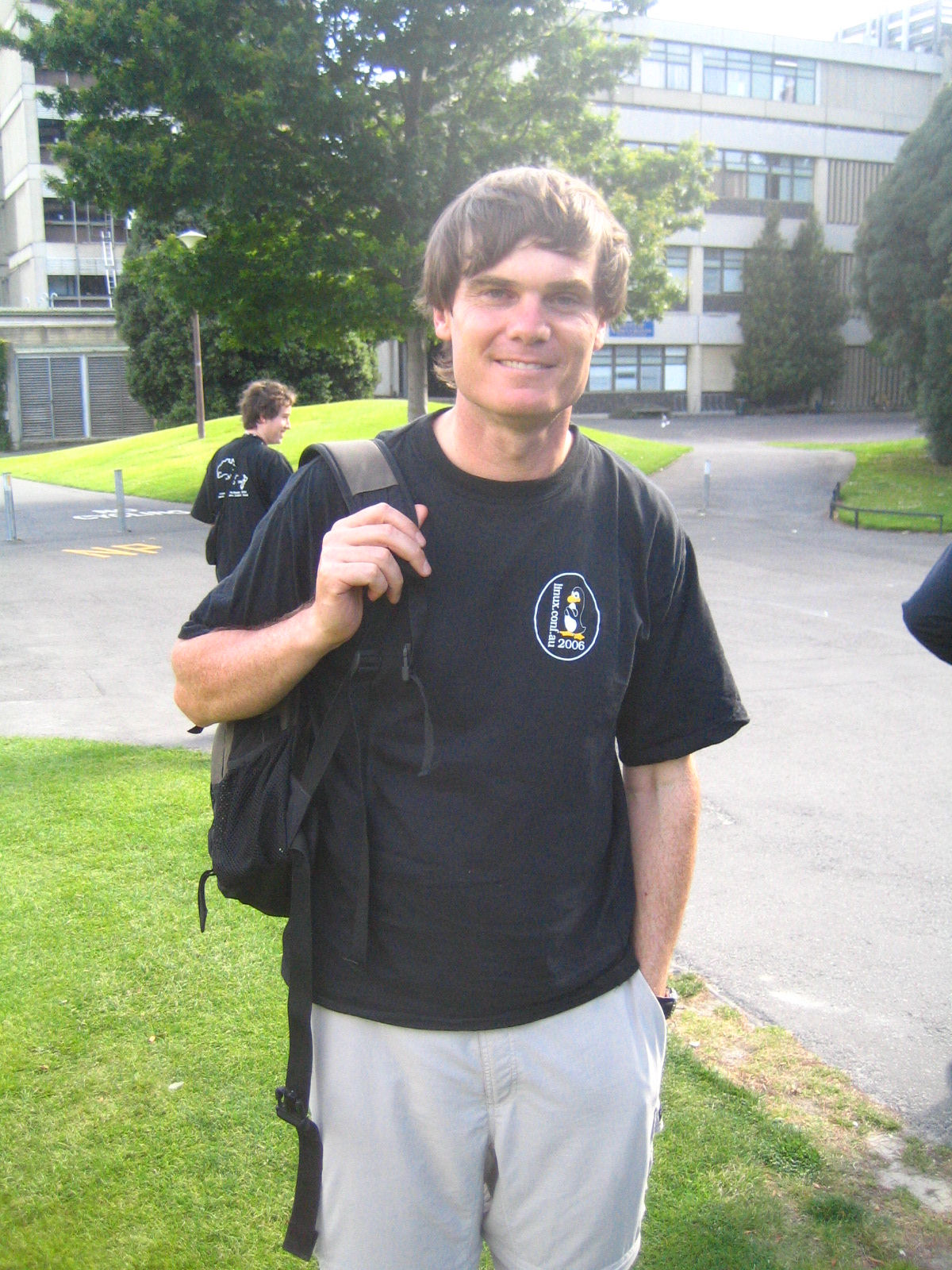- Andrew Tridgell
Infobox person
name=Andrew Tridgell
birth_date=birth date and age|df=yes|1967|02|28
occupation=Programmer
known_for=rsync , Samba
nationality=Australian
employer=IBM
other_names=TridgeAndrew "Tridge" Tridgell (born 28 February 1967) is an
Australia ncomputer programmer best known as the author of and contributor to the Sambafile server , and co-inventor of thersync algorithm.He is known for his analysis of complex proprietary protocols and
algorithm s, to allow compatiblefree software implementations.Projects
Tridgell was a major developer of the Samba software, analysing the
Server Message Block protocol used forworkgroup and network file sharing byMicrosoft Windows products. He developed thetalloc hierarchical memory allocator, originally as part of Samba.For his PhD thesis, he co-developed
rsync , including the rsync algorithm, a highly efficient file transfer and synchronization tool. He also was the original author ofrzip , which uses a similar algorithm to rsync.He is the author of [http://samba.org/KnightCap/ KnightCap] , a reinforcement-learning based
chess engine .Tridgell was also a leader in hacking the
TiVo to make it work in Australia, which uses thePAL video format.In April 2005, Tridgell tried to produce free software (now known as
SourcePuller ) that interoperated with theBitKeeper source code repository. It was a source of controversy and was cited [ [http://lwn.net/Articles/169178/ git [LWN.net ] ] as the reason that BitMover revoked the license that allowedLinux developers free usage of their BitKeeper product. This resulted in a messy public falling-out between Tridgell andLinus Torvalds , in which Tridgell stated that he had never had a BitKeeper license so he couldn't violate it and had acted entirely ethically in analysing and implementing the protocol, something he'd previously done with the Samba protocol. Tridgell's involvement in the project resulted in Linus accusing him of playing dirty tricks with BitKeeper [ [http://www.theregister.co.uk/2005/04/14/torvalds_attacks_tridgell/ Torvalds knifes Tridgell | The Register ] ] .The broad extent of Tridgell's analysis started bytelnet ing to a BitKeeper server and typingHELP[ [http://www.groklaw.net/articlebasic.php?story=20050421023821174 Groklaw - Tridge Speaks ] ] , something that, seemingly, no-one else had previously thought to try.Academic achievements
Attending
Barker College Hornsby, NSW, Tridgell completed his HSC in 1984. Tridgell completed ascience degree with majors inapplied mathematics andphysics at theUniversity of Sydney in 1988, before moving toCanberra to complete anHonours degree at theAustralian National University , in which he received first class honours intheoretical physics .Tridgell completed a
PhD at the Computer Sciences Laboratory of theAustralian National University . His original doctorate work was in the area ofspeech recognition but was never completed. His submitted thesis 'Efficient Algorithms for Sorting and Synchronization' was based on his work on thersync algorithm.Employment
Tridgell started his career working for
Efam Resources from 1987 to 1988, designing computer models offinancial markets . His work led to a product named The Options Analyst, which he marketed and sold for five years.From 1988 to 1989, Tridgell worked as a software developer for a company named Sonartech Pty Ltd (now Sonartech Atlas), which developed
sonar technologies for Australiansubmarine s. He worked on passive sonar technology.Between 1989 and 1990, Tridgell was employed at the Research School of Biological Sciences in the Australian National University, making computer models of physical and biological events and environments such as bushfire spread and
population dynamics .From 1991 to 1999, Tridgell held various other positions at the Australian National University, such as
UNIX administration,satellite control, andsupercomputer research. During this period he was seconded to the Cooperative Research Centre for Advanced Computational Systems, where he headed the PIOuS (Parallel Input/Output System) project - later HiDIOS (High-performance Distributed Input/Output System) - for parallel file systems on the Fujitsu AP1000 and AP+ supercomputers. Tridgell also went on to lecture, first as an associate lecturer, and then as a casual lecturer, in the university's Computer Science division. He remains a Visiting Fellow of the University.In mid-1999, Tridgell joined the LinuxCare company's office in Canberra as their first Australian employee. He helped to assemble 14 staff for a research and development team known as OzLabs.
Linux and open-source companies were quite a new concept at this stage. Tridgell was made a research fellow of Linuxcare in 2000.In March 2001, Tridgell joined VA Linux Systems. He worked in the
network attached storage division for VA Linux Systems, making enhancements to Samba and theLinux kernel to provide enhanced performance for their network-attached storage device range.Tridgell continued his work with network-attached storage technologies when he joined
Quantum Corporation as a Senior Engineer in the Storage Systems Group. His role once again involved developing functionality and efficiency modifications into Samba to enhance Quantum's GuardianOS-poweredSnap Server network-attached storage device. One of the features that he added to Samba at this time was support forMicrosoft 'sActive Directory technology, a new authentication system introduced with Microsoft's Windows 2000 Server product range.In 2004, Tridgell was employed by
IBM working remotely for theAlmaden Research Center . In January 2005, he joined theOSDL on a one-year fellowship [http://www.osdl.org/newsroom/press_releases/2005/2005_01_17_beaverton.html] ; he then returned to IBM. [http://www.osdl.org/newsroom/press_releases/2006/2006_Feb_01_beaverton.html]Awards
* In October 2003,
The Bulletin magazine judged Tridgell to be Australia's smartestInformation and Communications Technology person. [ [http://sites.ninemsn.com.au/smart100/default.asp The Bulletin Smart 100 ] ] [ [http://bulletin.ninemsn.com.au/article.aspx?id=135066 The Bulletin publishes for the last time ] ]
* In January 2006, theFree Software Foundation awarded Tridgell its 2005Award for the Advancement of Free Software , for his work on Samba, the Linux kernel, and rsync. Tridgell was considered to have furthered an important goal of the free software movement since the founding ofGNU , analyzing ways for free software to interact with widespread proprietary systems to allow people to more easily move away from those systems.
* In July 2008, Andrew was named "Best Interoperator" at the Google-O'Reilly Open Source Awards, for his work on Samba andRsync . [ [http://google-opensource.blogspot.com/2008/07/and-winners-of-2008-google-oreilly-open.html Google Open Source Blog: ... and the winners of the 2008 Google-O'Reilly Open Source Awards are ] ]References
External links
* [http://www.samba.org/~tridge/ Andrew Tridgell's website]
* [http://samba.org/~tridge/phd_thesis.pdf Efficient Algorithms for Sorting and Synchronization (PhD thesis)] - (406kB PDF)Persondata
NAME= Tridgell, Andrew
ALTERNATIVE NAMES=
SHORT DESCRIPTION=Australia ncomputer programmer
DATE OF BIRTH=28 February 1967
PLACE OF BIRTH=
DATE OF DEATH=
PLACE OF DEATH=
Wikimedia Foundation. 2010.
